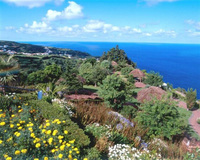Swim with dolphins and enjoy whale watching in the Azores

Where in Europe can you swim with wild dolphins or have the chance to see a blue whale migrating through? The beautiful islands of the Portuguese-owned Azores are considered by many marine biologists to be the best place in Europe to see whales.
Sperm whales and several species of dolphin are resident year-round in the waters around these nine volcanic islands set out in the middle of the Atlantic whilst migratory species of whales, dolphins and turtles pass the islands at various times throughout the year. Migratory species include pilot whales, killer whales, sei whales, fin whales and, of course, the biggest cetacean of all, the mighty blue whale.
Whaling used to be an important industry to the Azorean population, but, since this practice ceased for good in the 1980s, the people of the Azores have successfully replaced it with whale watching and excursions are now offered by many companies from four of the nine islands; Sao Miguel, Terceira, Faial and Pico. It is also possible to observe whales close to the shore from other islands. Excursions are either on board medium sized vessels taking up to 80 people or, in small groups on motorised inflatable boats which take 12 people and deliver a more exhilarating experience, closer to the water.
Visitors can see whales and dolphins throughout the year due to the resident species of the archipelago. There are also many migratory species passing through. Spotted dolphins are more common during the summer while blue whales are most frequently spotted during the spring and autumn. Sperm whales, sei whales and bearded whales are most frequently seen in the summer.
Swimming with dolpins
Swimming with dolphins in the wild is also possible in the waters around the Azores where the four species regularly spotted include Common, Bottlenose, Risso and Atlantic Spotted Dolphin. Holidaymakers are able to swim in small groups from the back of the boat and play with the dolphins in the water. No pens are used, the dolphins are free to swim away, or stay and play. They usually like to stick around to enjoy the fun!
Responsible tourism
The people of the Azores take their responsibility for the cetaceans living in and visiting their islands very seriously and many companies begin their excursions with a briefing from a marine biologist linked to the University of the Azores. One campus of the university, in Horta, Faial island, houses an investigation and scientific centre for Marine Biology, Oceanography and Fisheries. Together with other universities and research centres around the world, the centre studies the population, migration and routes of these marine animals. During the excursions, minimum distances are observed to ensure the whales are not disturbed and experts accompany the 'swimming with dolphins' trips to ensure that both the animals and the tourists are safe and happy.
For those who are interested in the whaling traditions of the islands, there are many whaling museums where the traditional crafts of this now extinct activity are preserved. Two good examples are the Whaling Museum in Lajes and the Whalers Industry Museum in Sao Roque, both on Pico island.
Nautical Festivals in the Azores
Semana do Mar : Faial Island : 5 - 12 August 2012
Semana do Mar is one of Portugal's most important nautical festivals. It takes place at the Horta Marina, considered to be one of the best marinas in the world. During the week of the festival, several regattas are organised, one of which is the 'Whaler Boats Regatta' where traditional whaling boats, banned since the 1980s, are sailed.
Semana dos Baleeiros : Pico Island : 20 - 26 August 2012
Semana dos Baleeiros is dedicated to Nossa Senhora de Lourdes (Our Lady of Lourdes), patroness of the whalers, and an old tradition of Pico Island. The festival dates back to 1882, when a storm threatened the lives of the whalers who were trying to return to Port Lajes on Pico. Nowadays, as well as the religious celebrations, there are also music performances, traditional events and shows, as well as sporting activities which take place around the Whaling Museum in Lajes.
SATA (the airline of the Azores) flies direct from Gatwick to Ponta Delgada, Sao Miguel, every Saturday from April to October. There are a number of tour operators offering holidays to the Azores from the UK. Details can be found on the Azores website at Book Your Trip
To find out more about The Azores Islands, go to visitazores.com.

